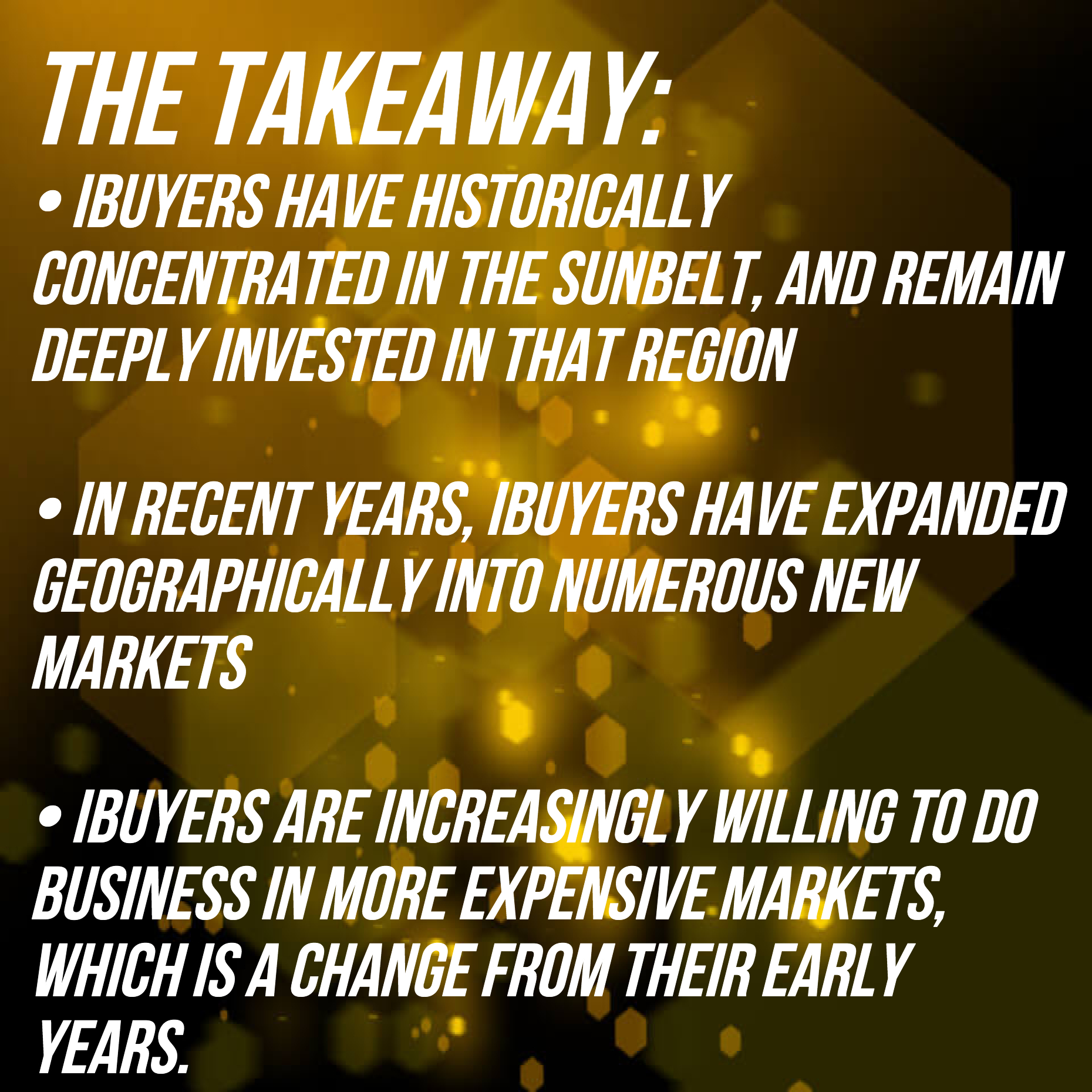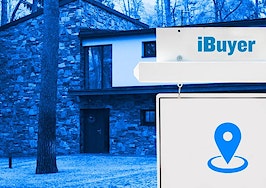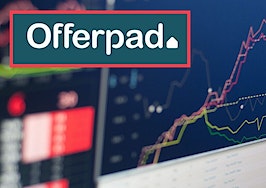Portions of this story first appeared in Inman’s 2018 Essential Guide to iBuyers.
The story goes that Eric Wu began his real estate journey when he was a college student at the University of Arizona, using $20,000 in scholarship money to buy a rental property. Then he quickly managed to parlay that investment into more, and by the time Wu graduated in 2005, he had a portfolio of 25 properties, according to CNBC.
But Wu wasn’t done.
He went on to found multiple startups, including neighborhood information site Movity — which Trulia eventually bought in 2010. Wu went along with the deal and spent time working at Trulia, then finally in 2014 launched the project that really made him famous: Opendoor.
Wu and Opendoor effectively invented a new type of business that’s now known as “iBuying.” It’s a concept that has taken the real estate industry by storm, with billions pouring into startups and thousands upon thousands of homes passing through the portfolios of companies like Wu’s. More than any other trend in real estate, iBuying captures the current ethos of big money, big deals and big ambitions.
But iBuying now finds itself at a crossroads. Zillow, one of the biggest players in the space, abruptly bowed out just months ago. And while companies such as Opendoor press on, it remains to be seen how they can evolve, and ultimately reach profitability. All of which is to say that 2022 is a pivotal moment for one of the most pivotal concepts real estate has seen in a generation.
Here’s everything you need to know right now:
Table of Contents
- What is iBuying?
- Who are the iBuyers?
- What about Zillow?
- How big a deal is iBuying right now?
- How are the iBuyers funded?
- What do iBuyers offers look like?
- What does the future hold for iBuying?
What is iBuying?
If you’ve ever pulled off the freeway in a major American city, you may have noticed a sign tacked to a nearby telephone pole promising to “buy houses fast!” These signs have been ubiquitous for years and hint at a real need: Some homeowners want to sell their home quickly and for cash.
Enter the “instant buyer,” or “iBuyer.”
IBuyers are companies that take the old we-buy-houses-for-cash concept, then attempt to use technology to make it a better, more efficient process. Once they buy a property, iBuyers usually do minor repairs and maintenance, then try to quickly re-list the home and sell it for a profit.

Victor Lund
There are, however, a few things that set the iBuyers apart. Funding is chief among them.
“It’s a little bit of a weird thing that’s been around for a long time,” Victor Lund, founder of the real estate consulting firm WAV Group, told Inman back in 2018. “But I think what we’re seeing now is a little bit different thing, which is companies backed by financial investors.”
Pete Flint, an entrepreneur and former CEO of Trulia, agreed, previously telling Inman that the flow of capital into real estate began after the housing crash more than a decade ago when “opportunistic folks on Wall Street saw housing assets” and “money moved in a big way.”

Pete Flint | Photo credit: NFX
“As the market has bounced back and Wall Street has seen returns in that area, there are significant amounts of capital that are available that can be put to work,” Flint said.
Scroll down for more specifics on the iBuyers’ funding, but for now suffice it to say that one of the defining features of the major iBuyers is that they have a lot of money.
That big money also enables the iBuyers’ other defining trait: technology.
The big iBuyers also have proprietary apps, algorithms and engineering teams that they use to set their buy boxes — or the parameters within which they buy properties — as well as to price specific houses. The iBuyers’ tech also generally allows them to provide offers to homeowners quickly. Moreover, some iBuyers leverage their technology for other purposes as well, such as when Opendoor uses its app to unlock on-the-market homes for would-be buyers to tour.
“The premise around these iBuyers is to use capital and use technology to reduce friction,” Flint also said. “There’s a significant amount of consumer demand for this type of service.”

Additional resources:
- The Essential Guide to iBuyers
- All the biggest challenges facing all the biggest companies in real estate
- IBuyer transactions return to near pre-pandemic levels
- Join us throughout February for iBuyer month at Inman
Who are the iBuyers?
At the moment, iBuying is dominated by what might be termed the big three: Opendoor, Offerpad and Redfin.
Real estate analyst and iBuying expert Mike DelPrete identified Opendoor in a 2021 report as the leader among these companies, noting that in 2020 the firm represented 50 percent of the iBuying market. Offerpad controlled another 23 percent, while Redfin had 1 percent.
Notably, Opendoor’s share has fallen from 70 percent in 2018, mostly due to the rise of Zillow Offers (more on that below).

Credit: Mike DelPrete
There are other players as well. For example, big names such as Realogy, Keller Williams and Rocket Homes all have their own versions of a cash offer program.
A number of other startups such as Orchard, Bungalo, Roofstock, Properly and others also offer variations on the iBuying concept, in some cases combining those services with “power buyer” offerings. Some of these companies have also scored major victories when it comes to fundraising, and their existence highlights the intense interest iBuying continues to generate among investors and startup founders.
Additional resources:
- 2022 will be pivotal for Offerpad as it competes for the iBuyer crown
- Redfin in 2022: Does slow and steady ultimately win the race?
- ‘IBuyers have never been bigger’: Mike DelPrete
- RealSure, Realogy’s iBuyer joint venture, gets first CEO
- Keller Williams hires former eXp, Zillow exec to oversee iBuying
- Orchard raises $69M, sets ambitious goals to be real estate’s Amazon
- Rocket Homes hiring in-house agents, launching iBuyer program
What about Zillow?
Up until last fall, Zillow was the second largest iBuyer in the U.S. after Opendoor, with DelPrete noting that its share of the sector stood at 26 percent in 2020. That’s up from just 3 percent in 2018.
However, the company announced in a November earnings report that it planned to discontinue Zillow Offers, its iBuying wing, and sell off all of its remaining inventory of homes — which had numbered more than 9,000 just a couple of months earlier. As of early December, Zillow had sold off about half of its inventory, and the company declined to provide an additional update on those numbers as of late January.

Mike DelPrete
In a conversation this week, DelPrete characterized the failure of Zillow Offers as “the consequences of scaling too fast, or getting the fundamentals wrong.”
At this point, Zillow’s exit from iBuying is mostly a story for the history books.
Nevertheless, the end of Zillow Offers was such a big deal — arguably the biggest single event since iBuying first began — that it deserves a mention. Specifically, Zillow’s exit from iBuying prompted a wide-ranging debate about both Zillow’s future and of iBuying generally. Other iBuyers also went on the record stating that they were still active in the space and unaffected by the issues that plagued Zillow, and other reports placed the blame on Zillow for the stumble. But either way, the episode represented a major shakeup of the iBuying landscape.

Additional resources:
- Zillow to shut down iBuying program Zillow Offers
- Zillow Offers’ demise ‘attributable to internal factors,’ report claims
- Zillow after Zillow Offers: Here’s what happens next
- Zillow Offers is dead. But Zillow (and iBuying) is here to stay
- Zillow close to unloading more than half of its iBuyer homes
- Zillow was outsmarted by the market
How big a deal is iBuying right now?
According to the December Realtor Confidence Survey, which the National Association of Realtors (NAR) compiles based on thousands of survey responses, 2 percent of sellers who worked with a Realtor sold to an iBuyer in both December and November of 2021. While that sounds like a tiny number, NAR further pointed out that based on 6.12 million existing home sales in 2021, that means iBuyers likely bought about 122,000 existing homes last year.
A report published late last month by real estate data firm CoreLogic further found that iBuyer’s “purchase activity doubled compared to 2019 levels.” CoreLogic’s report concluded that only 1 percent of home sales were to iBuyers — a smaller figure than the one NAR arrived at — but noted that the sector is growing.
A report that Zillow published in December additionally found that sales to iBuyers represented 1.9 percent of the market in the third quarter of 2021.
Finally, DelPrete on Tuesday described 2021 as “a transformative and record-breaking year for iBuyers.” DelPrete found that iBuyer market share hit an all-time high of 1.3 percent in 2021, which is significantly higher than the 0.5 percent market share DelPrete found iBuyers had in 2019.
“IBuyers are one of the leading disruptive models in real estate,” DelPrete wrote. “Their ability to grow, in all types of markets, is an important signal as to what degree the traditional real estate transaction can be disrupted.”
While different analyses have come up with slightly different numbers, the overall takeaway is that iBuying currently represents a small share of the overall housing market.
However, it would be a mistake to assume that because iBuying has a small market share it also isn’t a big deal. In fact, the contrary is true. As virtually every recent report has pointed out, iBuying is growing rapidly and is unlikely to disappear.

Additional resources:
- IBuyers flipped 1 in 5 homes to institutional investors in 2021
- IBuyers net record-high sales in Q3 amid skyrocketing purchase volume
- Redfin CEO Glenn Kelman ‘skeptical’ about iBuyer growth
How are the iBuyers funded?
All of the three big names in iBuying are now publicly traded companies.
Opendoor made its public debut in December 2020. As of the beginning of this week, shares in the company were selling for around $10. Opendoor has a market cap of about $6.6 billion.

Credit: Google
Offerpad went public in September and now has a market cap of about $901 million. Shares in the company were trading in the mid $3 range Tuesday.
Redfin went public in 2017, before it entered the iBuying business. Shares in the company were trading for just over $30 earlier this week, and the company has a market cap of about $3.25 billion.
Additionally, Opendoor and Offerpad have raised significant amounts of cash and debt. Opendoor famously received $400 million in 2018 from Japanese megafund Softbank, which at the time brought the company’s total equity financing to more than $1.045 billion. More recently, Opendoor has moved to increase its borrowing limit to $9 billion and to raise up to $862.5 million in new debt.
Offerpad has raised significant funds as well. In 2019, for example, the company closed a Series C funding round that brought its total haul to $975 million. More recently, the company secured more than $600 million in credit.
Beyond investors and the stock market, the iBuyers make money from service fees, price appreciation on the homes they buy and selling ancillary services such as title and mortgage, according to DelPrete’s 2021 report. 
Additional resources:
- Offerpad secures over $600M in credit in bid to expand iBuying
- Opendoor looking to raise up to $862.5M in new debt
- Opendoor boosts homebuying power with $9B borrowing limit
- Opendoor raises $100M in debt financing from homebuilder Lennar
- Offerpad enters the NY Stock Exchange with a $2.7B valuation
- Opendoor raises $400M in funding from SoftBank
- Offerpad scores new funding as iBuyer competition heats up
Where are the iBuyers doing business?
Historically, iBuyers have concentrated in affordable Sunbelt cities such as Phoenix and Las Vegas. More recently, however, major iBuyers have expanded their geographic reach to much of the U.S.
CoreLogic’s recent report further breaks down iBuying hotspots, noting that the major players “have generally concentrated in areas that have seen the largest population gains in recent years.”
“The top five states that comprised 75 percent of overall iBuyer purchases since 2017 include Texas (20 percent), Arizona (20 percent), Florida (12 percent), Georgia (13 percent) and North Carolina (10 percent),” the report explains. “While these five states generally ranked in the top five since 2017, the ramp up of activity in 2021 in California brought the state to fourth place, replacing North Carolina.”

Credit: CoreLogic
The report goes on to note that “76 percent of purchases were located in 10 metro areas in those states.”
Recent months and years have also seen the iBuyers tackle more complicated markets. Multiple iBuyers now operate in Los Angeles, for example, which has notoriously high home prices and an older building stock than cities like Phoenix. And last summer DelPrete noted that iBuyers are increasingly targeting the Northeast.

Additional resources:
- Opendoor launches in 6 new cities, achieves sales milestone
- Opendoor surpasses 42-market expansion goal 4 months early
- RedfinNow expands into pricey San Francisco and Seattle markets
- RedfinNow expands in California
What do iBuyers offers look like?
Traditionally, iBuyers have focused on mid-priced homes in tract developments that were built no earlier than the latter decades of the 20th century. The idea was that the uniformity of such homes made them easier to price, renovate and sell.
Such homes remain popular among iBuyers, but a December report from real estate tech startup and iBuyer marketplace Zavvie showed that iBuyers’ average purchase price increased 47 percent between the final months of 2020 and the third quarter of 2021.

Credit: Zavvie
IBuyers have also recently become less selective and now target a broader array of homes, the report notes.
Intense competition has in part driven these trends, and the winners have turned out to be consumers; Zavvie’s report shows that during the first half of 2021, iBuyers offers averaged 104.1 percent of homes’ market value. The average dipped to 100.6 percent of market value in September, but it nevertheless meant consumers were still getting above market value for their properties.
Additionally, Zavvie’s report notes that iBuyers’ service fees averaged 4.88 percent.

Additional resources:
- Offers from iBuyers are getting weaker: zavvie report
- Opendoor to make iBuyer offers on listings in real time at realtor.com
What does the future hold for iBuying?
In his recent conversation with Inman, DelPrete pointed out the major players have not yet managed to turn a profit, and that profitability remains an “unanswered question.”
“The scale of iBuying, to really make it work from a financial standpoint, it needs to be big,” he said. “These companies need to be buying 3,000, 4,000, 5,000 houses a month. Which is a huge scale.”
On the other hand, scaling up also presents its own challenges.
“What I think often gets missed is, at this scale, there’s a huge amount of houses in inventory and even a small market fluctuation, even a quarter of a percent, can have a huge material impact on the bottom line,” DelPrete noted.
The important thing about this moment, though, is that a company like Opendoor is finally getting big enough that it may be able to provide answers to some of these questions.
“I think what’s different about 2022,” DelPrete said, “is we’re finally getting to the point where we can get some answers. Because we’re reaching that scale. We’re reaching the scale that was promised in the IPO.”
Beyond profitability, there’s also the question of how iBuyers will impact the agent community. Because iBuyers offer to work directly with consumers, there has been concern in some corners that they could edge agents out of the business.

Stefan Peterson
But that looks somewhat less likely now. Asked about how iBuying has evolved recently, Stefan Peterson — Zavvie‘s co-founder and chief data officer — told Inman last week that “it’s been interesting to note the high customer satisfaction levels among those who sold their house to an iBuyer.”
However, even with high levels of customer satisfaction, Peterson noted that most people who sell to an iBuyer are working with an agent. That suggests fears about potential negative impacts of iBuying on the agent community may not ultimately pan out.
“We’ve seen it’s become completely normalized for agents to request instant offers on behalf of their clients, and represent their clients through the iBuyer process,” Peterson said. “And it’s great how the iBuyers have embraced this reality through various programs to work successfully with agents.”

Additional resources:














